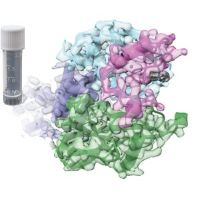Specification
| Description | Recombinant protein from the full-length sequence of Homo sapiens fetal and adult testis expressed 1 (FATE1) (NM_033085). |
| Organism | Homo sapiens (Human) |
| Expression Host | Human Cells |
| Tag Info | His or DYKDDDDK. Please contact us if you need further information or require specific designed tag. |
| Purity | Greater than 90% by SDS-PAGE gel |
| Uniprot ID | Q969F0 |
| Entry Name | FATE1_HUMAN |
| Gene Names | FATE1 FATE |
| Alternative Gene Names | FATE |
| Alternative Protein Names | Fetal and adult testis-expressed transcript protein (Cancer/testis antigen 43) (CT43) (Tumor antigen BJ-HCC-2) |
| Application | Antigens, Western, ELISA and other in vitro binding or in vivo functional assays, and protein-protein interaction studies; For research & development use only! |
| Buffer | Purified protein formulated in a sterile solution of PBS buffer, pH7.2, without any preservatives |
| Endotoxin | Endotoxin level is < 0.1 ng/µg of protein (<1EU /µg) |
| Length | 183 |
| Molecular Weight(Da) | 20712 |
| Protein Sequence | (The sequence of expressed protein may have some variation from the sequence shown below. Please contact us for the exact sequence.) MAGGPPNTKAEMEMSLAEELNHGRQGENQEHLVIAEMMELGSRSRGASQKKQKLEQKAAGSASAKRVWNMTATRPKKMGSQLPKPRMLRESGHGDAHLQEYAGNFQGIRFHYDRNPGTDAVAQTSLEEFNVLEMEVMRRQLYAVNRRLRALEEQGATWRHRETLIIAVLVSASIANLWLWMNQ |
Background
| Function | FUNCTION: Involved in the regulation of endoplasmic reticulum (ER)-mitochondria coupling. Negatively regulates the ER-mitochondria distance and Ca(2+) transfer from ER to mitochondria possibly implicating it in the regulation of apoptosis (PubMed:27402544). May collaborate with RNF183 to restrain BIK protein levels thus regulating apoptotic signaling (PubMed:26567849). {ECO:0000269|PubMed:27402544, ECO:0000305|PubMed:26567849}. |
| Pathway | |
| Protein Families | |
| Tissue Specificity | Testis-specific in fetus (aged from 6 to 11 weeks). In adult, expressed predominantly in testis, with some expression in lung, heart, kidney, adrenal gland and whole brain (PubMed:11694338). Highly expressed in certain types of cancer tissues such as hepatocellular carcinoma, colon and gastric cancer. Weakly expressed in normal pancreas (PubMed:12865919). {ECO:0000269|PubMed:11694338, ECO:0000269|PubMed:12865919}. |
QC Data
| Note | Please contact us for QC Data |
| Product Image (Reference Only) |  |

